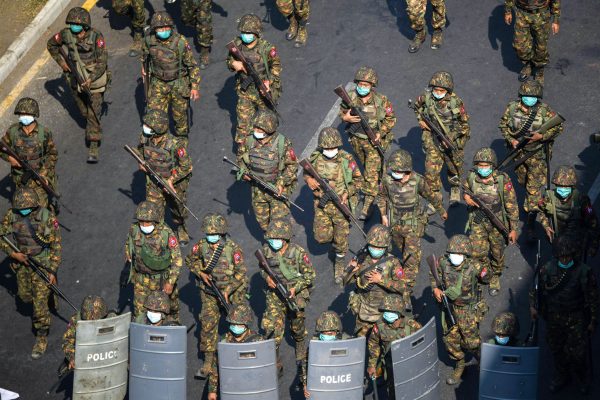But does this criticism match the reality of what Australia has done?
Australia has put its name on statements condemning the coup in international bodies including the United Nations. Minister for Foreign Affairs Marise Payne has issued six formal statements on Myanmar since the start of February, including unequivocal language calling for the National Assembly to reconvene consistent with election results. She has spoken to more than 20 counterparts about the situation in Myanmar. Defence cooperation has been suspended (Australia already has an arms embargo on Myanmar) and development aid has been redirected to immediate humanitarian needs. As the situation has worsened, with the military using violence to suppress protests, additional humanitarian aid has been pledged.
Australia has not minced its words. Prime Minister Scott Morrison said: ‘We have been a longstanding supporter of Myanmar’s democratic transition, including the election in November … We all hope for what I know the Myanmar people want to achieve’. Australia’s most senior diplomat Frances Adamson has called the military coup ‘catastrophic’.
There is no doubt about Australia’s position on the coup. Australia believes that a well-governed and stable Myanmar is in the interests of Australia and the region. Other countervailing interests are not significant enough for Australia to prioritise them over human rights concerns. Trade is unlikely to have an impact given Myanmar only just makes it into Australia’s top 50 export destinations. The situation of detained Australian Professor Sean Turnell, an economic adviser to ousted State Counsellor Aung San Suu Kyi, has not stopped Australia from speaking out despite fears it might be affected by hostage diplomacy.
The question for Australia is a tactical one: what is most likely to improve the situation for the people of Myanmar? Given that Australia’s reaction has been clear and unequivocal from day one, further condemnation is unlikely to have any greater effect. There are three areas where criticism seems justified.
First, while Australia already has some targeted sanctions on Myanmar, it would have been useful to have the option to be able to impose more. Unfortunately, Australia cannot do so easily or quickly under its current system. In this, Australia lags behind, as was shown recently when it could not coordinate with other countries in imposing sanctions relating to human rights abuses in Xinjiang. A parliamentary inquiry recently recommended Australia change this by introducing new Magnitsky-style laws, and draft legislation is expected to be tabled this year.
Second, while Australia’s long-term policy is to recognise states, not governments, this is no bar to communicating with the parallel Committee Representing Pyidaungsu Hluttaw (CRPH) government, as other countries have reportedly done.
Third, Australia should have immediately extended the visas of Myanmar students who fear to return. While students were reportedly being assessed on a case-by-case basis, there would have been no downside to announcing a blanket extension as an interim measure, as finally happened in early May.
Australia has decided the best tactical approach is to work with ASEAN. A number of ASEAN states are putting pressure on Myanmar, particularly Indonesia, Malaysia, Singapore and the Philippines. In a departure from its usual diplomatic style, the bloc convened a special summit to deal with the Myanmar issue, with Indonesia’s President Joko Widodo staking political capital on its success. The summit came up with a five-point plan including the immediate cessation of violence, ASEAN provision of humanitarian assistance and a visit by an ASEAN special envoy to meet all parties and facilitate mediation of a dialogue process. In these circumstances, it is reasonable for Australia to frame the question as how it can support ASEAN’s efforts.
What is striking in the case of Myanmar’s coup is that nobody thinks it is a good idea: not ASEAN, China, Japan, South Korea, the United States, the EU nor the G7. Some, like Russia and India, have chosen not to condemn, but there is nothing to suggest they welcome the coup. In this case, there is no conflict between those who focus on human rights and democracy and those who focus on stability and development, all of which have been jeopardised.
Junta leader General Min Aung Hlaing is friendless in his attempts to maintain power by trashing Myanmar’s constitution. But it has been hard for any external forces to have influence given limited leverage. If a regime does not care about international condemnation, it can brazen it out.
Myanmar’s coup is a reminder of the limits of any external influence, not just Australia’s. This should be kept in mind through any consideration of the impact Australia could have.
Melissa Conley Tyler is a Research Associate at the Asia Institute, The University of Melbourne.


Myanmar is currently facing an economic and humanitarian disaster of enormous proportions. International reactions should be proportionately calibrated. The bar for Australia must surely be that of its allies in the ‘five eyes’ countries; it cannot be ASEAN whose avowed interest is non-interference in the internal affairs of its member states and on the basis of its own charter can only address the aspirational adherence to human rights and democracy. The five point plan agreed at the last ASEAN summit, was, according to the NUG/NLD totally ignored the day after the Summit ended. The US, UK, EU, Canada, New Zealand suggest more robust sanctions than Australia; to include suspending political and military cooperation (NZ); identifying 10 plus influential individuals, both military and civilian and suspending dealings with two mega-military-controlled enterprises. A cynic might think that Australia might be going soft on Myanmar in order to keep onside with China!